Last Updated on June 19, 2025 by Lauretta Iyamu, PharmD
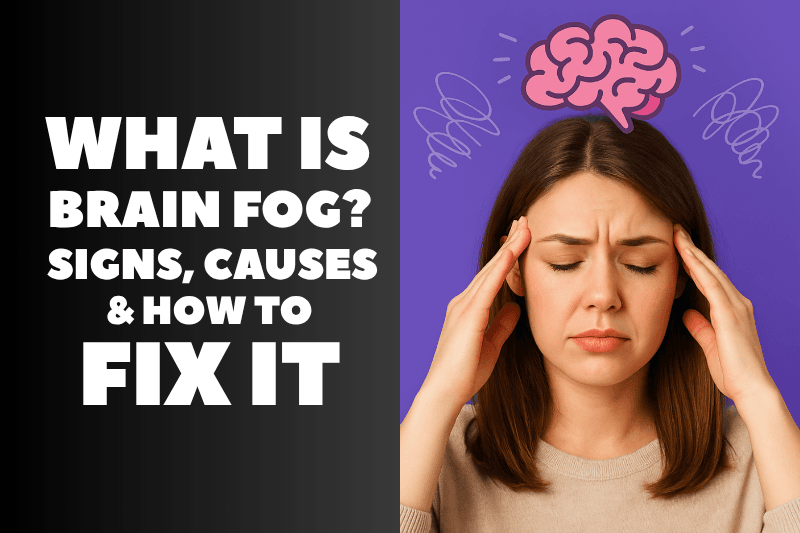
Brain fog is real.
And if you’ve been feeling mentally off, confused, forgetful, or just slow to think, then this article is for you.
Even though brain fog isn’t a medical diagnosis, it can still affect your life in a big way.
- You may be struggling to stay focused.
- You may forget simple things.
- You may feel like you’re moving in slow motion.
And the worst part?
You may have no idea why it’s happening.
That’s what makes brain fog so frustrating.
But once you understand what’s behind it, you can start clearing it.
Today you’ll learn…
- What is brain fog?
- What symptoms to watch for
- Why does it happen in the first place?
- And how to know when it’s time to get help
Let’s get started.
What Is Brain Fog?
Brain fog isn’t a disease.
It’s a warning sign.
It means your brain is struggling to function properly.
You may feel mentally slow.
You may have trouble focusing.
Your memory may not be as sharp.
This is what many people refer to as “foggy thinking.”
And it shows up differently for everyone.
- Some people feel like their thoughts are cloudy.
- Others say it’s hard to stay organized or finish simple tasks.
- Some even feel emotionally flat or disconnected.
Here’s what brain fog might feel like:
- Confusion
- Trouble concentrating
- Short-term memory loss
- Difficulty finding words
- Mental fatigue or tiredness
It’s like trying to think through a thick cloud that just won’t lift.
And even though doctors don’t use the term “brain fog,” they do recognize the symptoms, and those symptoms are real.
Why Brain Fog Matters
In today’s world, your brain has to work hard.
You’re expected to focus, remember, respond, and stay sharp every day.
So when brain fog shows up, even for a little while, it can affect everything, such as your:
- Job
- Relationships
- Confidence
- Ability to keep up with life
And for some people, the fog doesn’t go away.
That’s when it becomes more than just an off day.
That’s when you need to ask: What’s causing this?
What Are the Symptoms of Brain Fog?
Brain fog doesn’t always look the same.
But here are the most common signs to watch for:
- You can’t focus like you used to
- You forget things that used to be easy to remember
- Your thoughts feel slow or cloudy
- You lose your train of thought in the middle of a sentence
- You feel mentally tired even when your body isn’t
These symptoms can range from mild to severe, potentially interfering with your daily life.
For some people, brain fog is a short-term issue.
For others, it lingers for weeks or even months.
If you’ve noticed more than one of these symptoms, and they’re happening often, that’s a sign your brain may not be getting what it needs.
What Causes Brain Fog?
Brain fog doesn’t come out of nowhere.
It usually occurs when something else is happening in your body or your lifestyle.
Here are some of the most common causes:
Hormonal Changes
Brain fog is common during menopause, pregnancy, or thyroid problems.
When your hormones shift, your brain can sense the change.
Hormones play a crucial role in regulating your energy, mood, and memory.
If they drop or change too fast, your brain may feel foggy or tired.
Stress and Anxiety
High stress triggers the release of a hormone called cortisol.
When cortisol stays high for too long, it starts to slow down your brain.
You may feel overwhelmed, distracted, or forgetful.
Even basic tasks can feel harder than usual.
Lack of Sleep
Sleep is when your brain resets.
Without enough sleep, your brain can’t think clearly.
You may struggle to remember things or stay focused.
This is one of the most common causes of brain fog.
Medical Conditions
Some health problems cause brain fog as a symptom.
These include:
- Chronic Fatigue Syndrome
- Fibromyalgia
- Autoimmune diseases
- Diabetes
- Depression
If you have a condition like these, brain fog may be one more piece of the puzzle.
Medications
Certain medications can cause brain fog as a side effect.
Common ones include:
- Allergy meds
- Antidepressants
- Pain relievers
- Sleep aids
If your brain fog started after starting a new medication, it may be related.
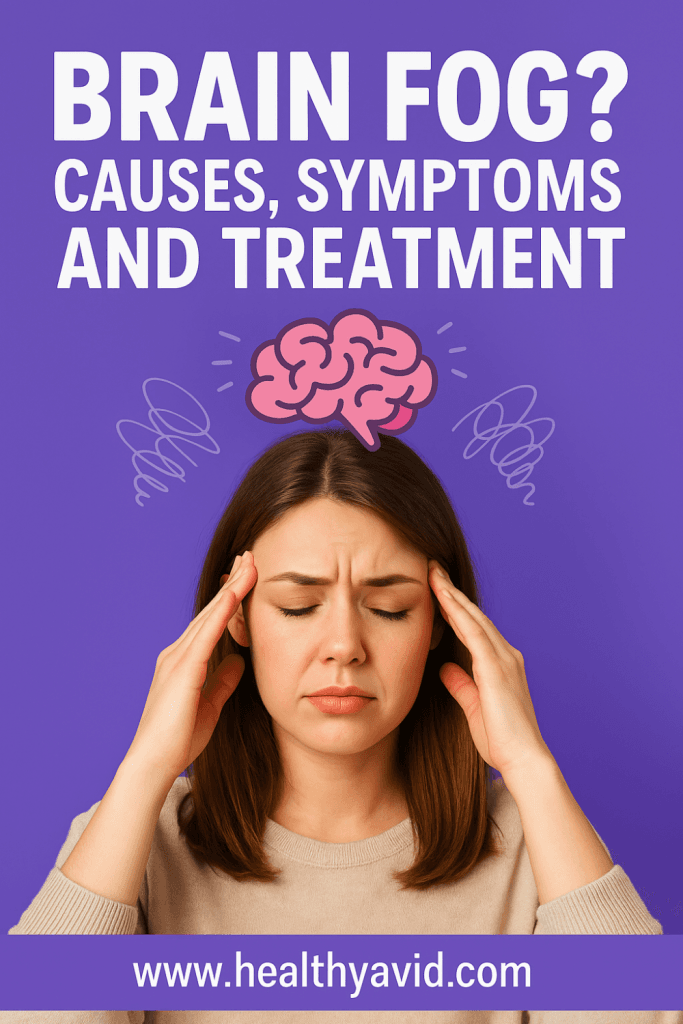
How Is Brain Fog Treated?
Brain fog isn’t something you can test with a single scan or blood draw.
That’s because brain fog isn’t a disease; it’s a symptom.
To determine the cause, your doctor needs to consider the broader context.
That usually starts with:
- A full medical history
- A list of your current symptoms
- A review of your medications
- Basic lab tests
These tests can help check for common issues like:
- Low thyroid
- Low iron
- Vitamin B12 or D deficiency
- Blood sugar problems
- Hormonal imbalances
In some cases, your doctor may also check your memory and thinking with a simple cognitive test.
But the goal isn’t to “prove” you have brain fog. It’s to find out what’s causing it so that you can fix it.
Helpful tip:
Write down your symptoms before your appointment.
Include how long they’ve been happening, when they’re worst, and anything that seems to trigger them.
This can help your doctor identify patterns that might not be apparent in lab results.
How Is Brain Fog Treated?
Once you know what’s behind your brain fog, treatment becomes much easier.
Most of the time, it starts with small changes to your lifestyle.
1. Improve Your Sleep
If you’re not getting enough sleep, nothing else will work.
- Aim for 7 to 9 hours of sleep every night.
- Try going to bed at the same time.
- Avoid screens and heavy meals before bed.
- Keep your bedroom dark, calm, and quiet.
Even one good night of sleep can make a big difference.
2. Manage Your Stress
Chronic stress wears down your brain.
Begin with simple tools like deep breathing, taking short breaks, practicing quiet time, or engaging in light exercise.
Don’t wait until you burn out; your brain needs recovery every day.
3. Clean Up Your Diet
Your brain runs on nutrients.
If you’re eating too much sugar or skipping meals, your brain will feel it.
Try adding more:
- Leafy greens
- Berries
- Nuts and seeds
- Fish or lean proteins
- Whole grains
Drink more water. Even mild dehydration can cause mental fatigue and mental fog.
4. Treat Underlying Conditions
If your lab results indicate low thyroid levels, low iron, or hormone imbalances, these conditions need to be treated.
When your body starts to recover, your brain typically follows suit.
5. Review Your Medications
If your symptoms started after you began taking a new medication, ask your doctor if there’s an alternative.
Sometimes, just adjusting the dose can help clear your thinking.
Can You Prevent Brain Fog?
You can’t prevent every case of brain fog.
But you can make it less likely to happen.
And if it does show up, you’ll be in a better position to manage it.
Here’s what helps the most:
- Get consistent, quality sleep every night
- Eat real, whole foods and avoid too much sugar and junk
- Drink plenty of water throughout the day
- Move your body regularly, even just light walking
- Take breaks from screens and noise
- Manage stress with simple tools like deep breathing, journaling, or quiet time
- Keep a routine that gives your brain time to rest and recover
The more you support your brain, the better it works.
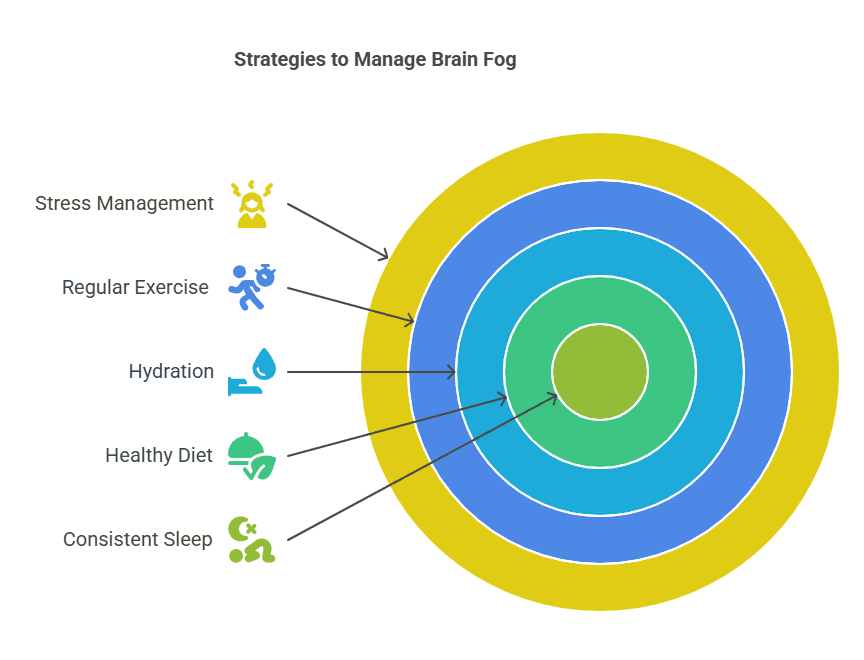 When Should You See a Doctor?
When Should You See a Doctor?
If your brain fog is mild and short-term, simple changes might be enough.
However, if it’s worsening, lasting more than a few weeks, or making daily life difficult, it’s time to consult a doctor.
Watch for signs like:
- Trouble focusing at work or at home
- Memory problems that affect your daily tasks
- Feeling foggy even after rest
- Other symptoms like hair loss, weight changes, or mood swings
These may indicate deeper issues that require treatment.
The Bottom Line
Brain fog can make you feel like something is wrong with you.
But it’s not about being lazy, slow, or broken.
It’s just your brain telling you it needs help.
Once you find the cause, whether it’s sleep, stress, hormones, or something else, you can take steps to fix it.
And when you do, that mental cloud can start to clear.
But now I want to hear from you:
Have you been dealing with brain fog?
What has helped you the most?
What questions do you still have?
Leave your comments below.
FAQs
What does brain fog feel like?
It feels like mental confusion, forgetfulness, and a slow thought process.
What causes brain fog?
Common causes include stress, lack of sleep, hormone changes, poor diet, and medications.
Can brain fog go away on its own?
Sometimes, yes. However, if it doesn’t improve within a few weeks, it’s best to investigate the cause.
What can I do right now to feel better?
Start with getting enough sleep, staying hydrated, eating a healthy meal, and taking a short break from screens and stress.
When should I see a doctor?
If brain fog is worsening or impacting your daily life, consult your doctor. It could be a sign of something that needs treatment.




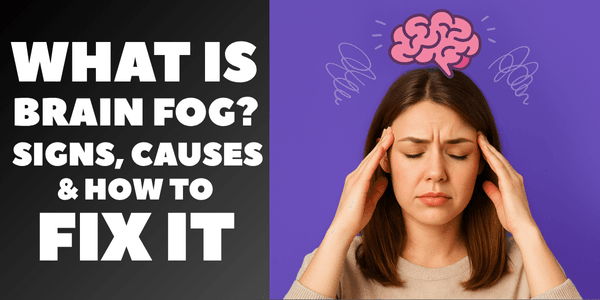
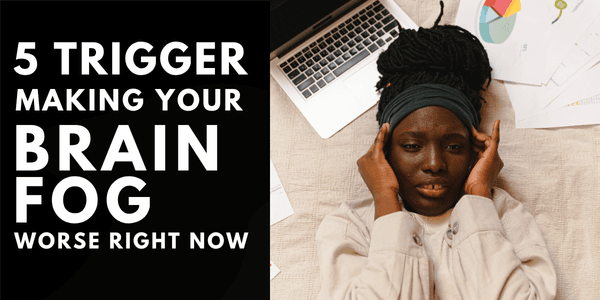




































Thank you for sharing this informative article on brain fog.